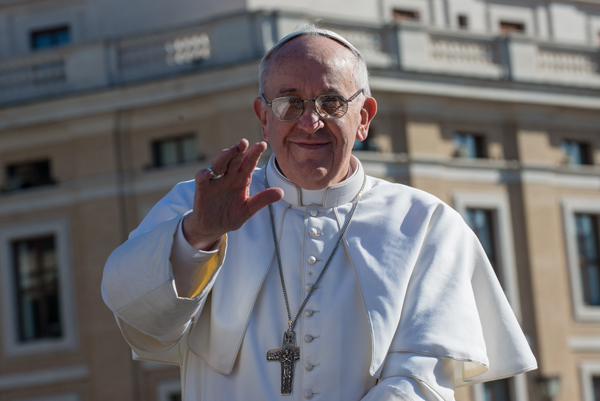
Pope Francis waves from the pope-mobile during his inauguration Mass at St. Peter’s Square on Tuesday (March 19) at the Vatican. World leaders flew in for Pope Francis’ inauguration Mass in St. Peter’s Square on Tuesday where Latin America’s first pontiff will receive the formal symbols of papal power. RNS photo by Andrea Sabbadini
Pope Francis released his first papal encyclical today, Lumen Fidei, a joint effort begun by his predecessor, Benedict XVI, and completed by the current pope just four months after his election. Francis had said previously that the result would be “the work of four hands.” James Martin, the Jesuit author and commentator, writes that
There is probably little that will be deemed ‘newsworthy’ in Lumen Fidei, save perhaps the strong linkage between faith and ‘justice, law and peace’ which reflects Francis’ emphasis on the poor.
That said, some are looking for newsworthy controversy in the document (or maybe just more clickthroughs on their websites). Consider this headline from The Australian: “Popes have no faith in gay marriage”. Likewise, the BBC includes this line in its report on the encyclical
In a passage relating to faith and family life, the Pope restates the Church’s opposition to gay marriage.
Neither article, or the gay blogs that picked up on the theme, posted the paragraph from the encyclical. Here it is:
52. In Abraham’s journey towards the future city, the Letter to the Hebrews mentions the blessing which was passed on from fathers to sons (cf. Heb 11:20-21). The first setting in which faith enlightens the human city is the family. I think first and foremost of the stable union of man and woman in marriage. This union is born of their love, as a sign and presence of God’s own love, and of the acknowledgment and acceptance of the goodness of sexual differentiation, whereby spouses can become one flesh (cf. Gen 2:24) and are enabled to give birth to a new life, a manifestation of the Creator’s goodness, wisdom and loving plan. Grounded in this love, a man and a woman can promise each other mutual love in a gesture which engages their entire lives and mirrors many features of faith. Promising love for ever is possible when we perceive a plan bigger than our own ideas and undertakings, a plan which sustains us and enables us to surrender our future entirely to the one we love. Faith also helps us to grasp in all its depth and richness the begetting of children, as a sign of the love of the Creator who entrusts us with the mystery of a new person. So it was that Sarah, by faith, became a mother, for she trusted in God’s fidelity to his promise (cf. Heb 11:11).
The passage certainly extols marriage and procreation, but those who support same-sex marriage (and who still care about papal encyclicals, an admittedly niche group) should ask a few questions before getting red in the face. Does talking about marriage between a man and a woman necessarily signify hostility to marriage equality? Do proponents of same-sex marriage accept the premise that marriage as an institution is in need of support? If so, are marriage equality supporters willing to work with those who might be hostile toward marriage equality (and vice versa, of course)? What’s unique about heterosexual marriage and procreation that marriage equality supporters might feel comfortable promoting?
With Pope Francis, it’s not yet clear how he’ll approach the subject of marriage. So far, he hasn’t said much. This in itself is a huge improvement from his predecessor. If those of us who support same-sex marriage want to find conflict, I suppose the passage above could be interpreted in such a way. But given that two of the four hands who wrote the document were attached to a pope whose hostility toward gay people was quite evident during his reign, I’ll hold off a bit and wait for Francis’s own words. I suspect we’ll continue to be pleasantly surprised in his pastoral approach to his papacy, including, hopefully, on issues important to LGBT people and their allies.
Read about encyclical highlights from RNS reporter Alessandro Speciale here.




